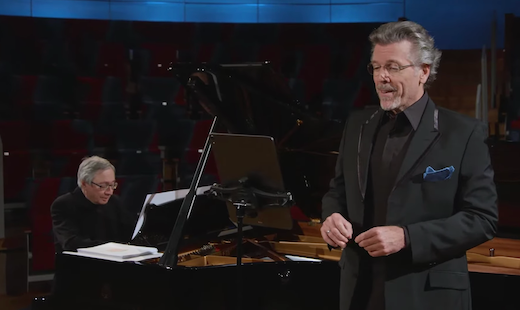Bachtrack: Thomas Hampson gives an outstanding recital in the Pierre Boulez Saal’s Schubert Week

Berlin’s Schubert Week, an opportunity to study and celebrate the great composer’s songs, is enjoying its third annual array of concerts, workshops and other programs thanks to the collaboration of the Pierre Boulez Saal, Hampsong Foundation (named after American baritone, Thomas Hampson) and the Lied Akademie of Internationales Liedzentrum Heidelberg. During the festivities, I was fortunate enough to catch a live-streamed recital of twenty songs – twelve by Franz Schubert, eight by his contemporaries – performed by Hampson and Wolfram Rieger on piano. As to be expected, the songs in this collection expressed early Romantic tropes on topics such as unrequited love, death, terror and desertion, but under Schubert’s touch, each musical nugget gleams like a multi-faceted gem.
The first half of the program began with Schubert’s Der Sänger, based on the story of a wandering minstrel’s fondness for good wine. But then the program shifted suddenly to non-Schubertian strains, including Um Mitternacht by Carl Friedrich Zelter, which describes a poet’s feelings during a moonlit, midnight assignation. Hampson sang this lovely song with feeling, but what I most recall was the exquisite delicacy of a leap of a tenth near the end, from a breathy low G to a high B. Absolutely divine.
Fascinating was Carl Loewe’s musical interpretation of Goethe’s Erlkönig, a very worthy telling of a horror story in music, with menacing trills in the piano, and Hampson playing all three roles – father, son and demon – with distinct personalities. The thin, whiny blandishments of the elf king have an almost liturgical rhythm, adding to the ambient sense of malaise.
Following a sweet reading of Loewe’s Wanderer’s Nightsong, the program was Schubert all the way, including two of my favorites: Schubert’s celebrated setting of Erlkönig, and one of the most terrifying works in the classical repertoire, Der Doppelgänger, a setting of a poem by Heinrich Heine.
Hampson’s extensive background on the opera stage may well have prepared him for the complexities of Schubert’s Erlkönig, one of the greatest classical songs of all time. Hampson deftly juggled the three voices, each a different character with a distinctive mood, while maintaining a flowing artistic partnership with Rieger. Few works of art can pack such an emotional punch in so short a time.
As for Der Doppelgänger, both Hampson’s evocative phrasing and Rieger’s unfailing instinct for tone and shading yielded a musical experience of great power and impact. The unstable harmonies, the relentless trudging of imagined footsteps, and singing as forlorn as a human voice can be, left an impression of a hopelessness that is not of this earth, and, indeed, was composed in the year of the composer’s death.
Though there were roses and sunlit meadows as well in this program, it was the darker moments that lingered, disturbed and, ultimately, enraptured. A universe of everything it means to be human was encapsulated in this sampling of Schubert songs, and the others weren’t bad, either. Thank you, gentlemen, for a program well crafted and satisfying in every conceivable way.